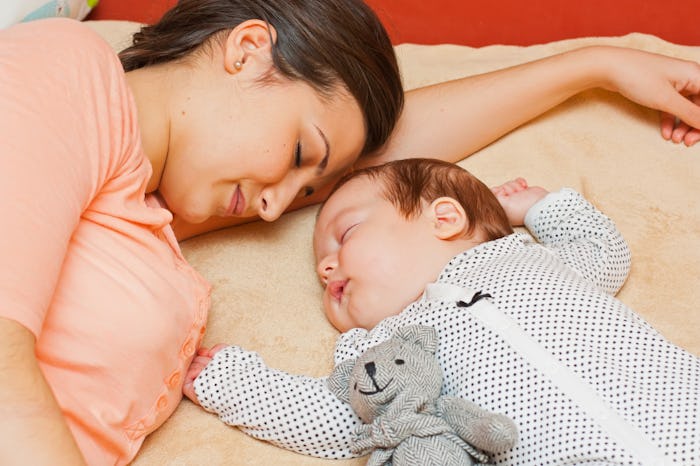Life

11 Things That Make Co-Sleeping Harder
For many parents, the decision to co-sleep with their child wasn't something they planned on doing prior to the baby's birth. Most set up a baby nursery complete with a beautiful crib and adorable bedding where their little one can sleep a full eight hours each night. Then reality sets in. Parents get tired of trekking back and forth all night to the nursery, and eventually the baby stays in the master bedroom, maybe even in the master bed. You are now officially a co-sleeper which often makes life easier. But, there are also things that can make co-sleeping harder.
Being at arm's reach of your baby throughout the night can help everyone in your family sleep longer and more restfully. But co-sleeping is also a commitment that often has an indeterminate end date. Just as you probably didn't plan to co-sleep, you may not have a set plan on when to transition your baby into his own bed, either. Whether it's because your child has grown and starting to take up more space or you because you are craving more alone time with your spouse, your feelings about co-sleeping can change with time.
Here are some things that can make co-sleeping with your child more difficult.
1You Get Unsolicited Advice
Everyone seems to have an opinion on how you should parent, and where your child sleeps is no exception. My family's co-sleeping became somewhat of a dirty little secret after I was repeatedly told that I was spoiling my child, that I was encouraging bad habits, that my children would never sleep on their own, and that it was unhealthy. Eventually, we stopped caring what other people thought, but as new parents it made us constantly question our decision to co-sleep.
2You Own A Small Bed
If you are bed sharing with your spouse and your child, not only can a small bed be uncomfortable, it can be dangerous. Dr. Sears recommends a queen or king-size bed for co-sleeping so that both the parents and the baby will have plenty of room to roll over safely.
3You Have More Than One Child
If you are already bed sharing with a toddler, consider keeping your infant in the room, but in a separate crib, bassinet, or play yard. Kids Health From Nemours warned that babies should not share a bed with other children, particularly toddlers, because they aren't aware of the baby's presence while they sleep. The organization also recommended not bed sharing with an infant under four months of age.
4Your Baby Is A Noisy Sleeper
Some babies make a lot of noise when they sleep. They can grunt, groan, root around, or gurgle throughout the night. If you're a light sleeper, these sounds may keep you up at night causing you to lose even more sleep than you already are. According to The Bump, these sounds often start around the second week of life and can last until your baby is around six months old and spends more time in REM sleep. Some sounds can indicate breathing problems, so it's important to inform your child's pediatrician.
5Your Spouse Snores
You may have already grown accustomed to the sound of a snoring spouse, but your newborn baby may not be, especially if the snoring starts after the baby has fallen asleep. The good news is the babies get used to sounds relatively quickly and will soon sleep right through the snoring.
6Your Partner Doesn't Want To Co-Sleep
Your dream of the family bed may not also be your partner's dream. Pregnancy and Baby suggested that in order for co-sleeping to work best, both parents should agree and feel comfortable with co-sleeping. Having one partner who doesn't feel comfortable with co-sleeping can make them feel displaced and create problems in your relationship.
7You Are Pregnant
It's difficult enough for a pregnant mom to get a good night's rest, especially if she's sharing the bed with two other people. Naturally, you are growing bigger, which can make bed sharing super cramped and uncomfortable. Consider bringing a toddler bed or small mattress into your room for your child to sleep on so that you can continue sharing a room and everyone can get much needed sleep.
8Your Child Won't Fall Asleep Unless You're In Bed
One of the greatest things about co-sleeping is that your child can usually fall asleep in 2.5 seconds flat – once Mommy's in bed, of course. Unlike parents who tuck their kids into bed and walk away, a lot of co-sleeping children find it difficult to fall asleep without a parent at their side. Any tired mama knows that no matter how good your intentions are to Netflix and chill once the little one is asleep, once you lie down, you're out like a light, too.
9You're Trying To Night Wean
When your baby has been used to having all night access to an unlimited milk supply, night weaning can be difficult, and seem darn-near impossible. Some moms who are ready to night wean find that their only option is to transition their toddler out of the family bed.
10Your Child Wets The Bed
Every bed sharing parent has woken up drenched in pee because of a leaky diaper. Even if your toddler is potty trained, occasional bed wetting is not uncommon. In fact, Very Well noted that 15 percent of children still regularly wet the bed at age five. Not only is this uncomfortable for everyone in the bed, but repeated bed wetting can cause permanent stains and a lingering odor in your expensive queen or king-sized mattress.
11You Want Your Bedroom Back
Co-sleeping is a wonderful experience, until it isn't. Maybe your child has gotten so big that no one sleeps comfortably anymore. Maybe you just want your child-free sanctuary back. Dr. Craig Canapari, director of the Yale Pediatric Sleep Center, wrote on his website that the time to stop co-sleeping when it's no longer working.